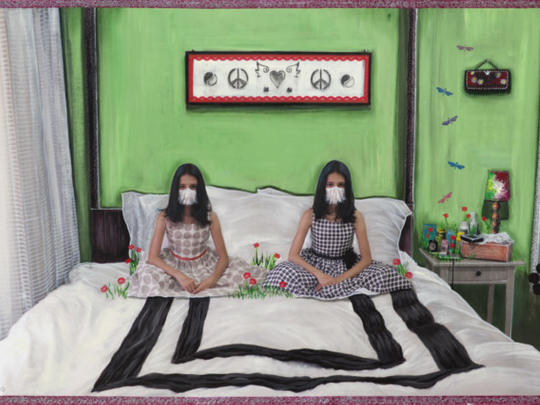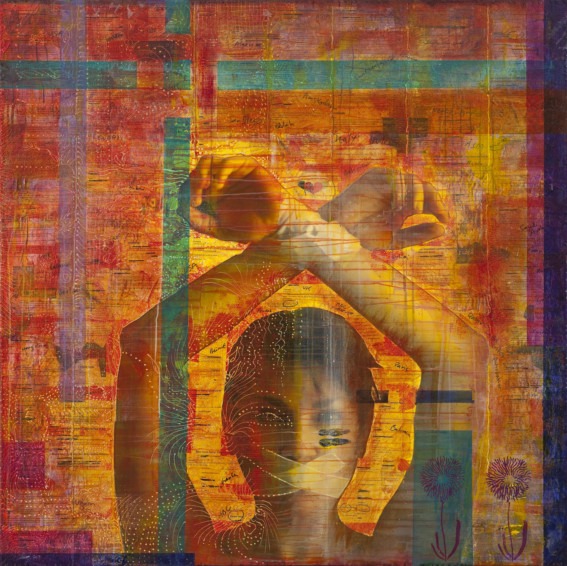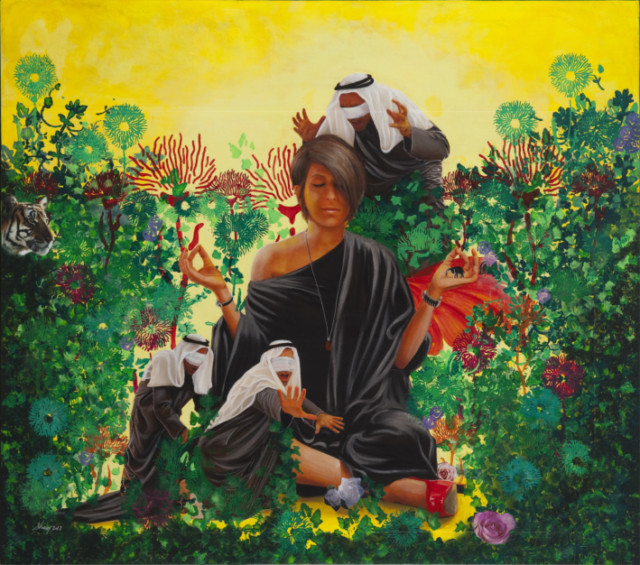
Last year, Shurooq Ameen’s exhibition in Kuwait was shut down by the authorities just a few hours after it opened. But that has not stopped the Kuwaiti-Syrian artist, who is a professor at Kuwait University, from expressing herself fearlessly in her work. Her latest exhibition, defiantly titled “Popcornographic”, explores themes of gender, identity, the oppression and exploitation of women in the name of tradition, and the hypocrisy that exists in Middle Eastern and Arab societies.
Ameen’s mixed media paintings are filled with vivid colours, photo collages and intricate details. They are based on her personal experiences, but resonate with women around the world. “When I decided to end my marriage after 17 traumatic years and tried to rebuild my life as a single mother and career woman, society turned against me. This made me acutely aware of the situation of women in this region and I expressed my anger through my art. My last show was closed down on the false premise that the artworks were pornographic or blasphemous. But the fact is that all I am trying to do is to hold a mirror up to our society and address issues that are usually swept under the carpet. I am trying to make people confront important issues that affect us so that there can be some positive change,” she says.
Although she deals with serious sociopolitical issues, Ameen uses humour and satire to convey her perspective, as is evident in the title of this show. “Popcornographic is not a real word, so it cannot be censored,” she says. The idea of “censorship” is a central theme in the show, and this is reinforced by the fact that the titles of all the artworks allude to famous novels or films that were once banned.
The pivotal work in the show is titled “To Kill a Mocking Girl” and depicts the artist with her hands tied and mouth gagged, in a reference to the black man unjustly convicted by a racist white jury in Harper Lee’s novel “To Kill a Mocking Bird”. But the war paint on her face, the defiant expression in her eyes and the words in the background tell another story. “When my show was shut down, people in my society did not support me, but I got thousands of mails of support from the international art community. That gave me the strength to continue working and fighting for the freedom of expression of women in this region. I printed those mails and pasted them on this piece of wood, integrating them into this painting, which became the starting point for the entire series,” Ameen says.
In works such as “Natural Born Censors” and “An Arabian Tragedy”, Ameen deals with the issue of subjective censorship in the Middle East. The paintings illustrate how the lack of clearly defined, logical criteria gives a few individuals the power to censor films, books, films and art based on their whims. The paintings also comment on the obsession of these “moral guardians” of society with covering not only a woman’s body, but also stifling her identity. “Although the women in these paintings are being manipulated like puppets, I have surrounded them with beautiful flowers as a symbol of hope that things will get better,” Ameen says.
The artist expresses her perspective on the role and position of women in Arab society through several powerful paintings. In “The Dates of Wrath”, she depicts a nicely dressed woman meditating peacefully in a beautiful garden, while blindfolded Arab men desperately try to cover her up or attack her. “I made the men tiny and covered their eyes because they are small-minded and blind to progress. They are focused on curbing and attacking the woman ... But the woman sits calmly in a paradise of flowers and greenery because like Tom Joad in Steinbeck’s ‘Grapes of Wrath’, she has learnt to adapt to her situation. She is a survivor who has a career and a position in society despite it all,” the artist says.
Ameen expresses her horror at the practice of older, married men using the cover of religious sanction to marry immature girls in a work titled “Of Wives and Men”, showing a scared, confused child-bride possessively held by an older groom. Like all the women in her paintings, the girl’s face is veiled to symbolise her lack of identity. But the man’s Hannibal-like mask says a lot. Similarly, in “The Last Straw”, the artist has appropriated Da Vinci’s famous painting to unmask the lustful intentions of men.
Other important issues the artist has tackled include the religious and sociopolitical rifts within the Islamic world, the stigma attached to tattoos, the impact of hypocrisy in society on the younger generation of Arabs and desire of people in this region to express themselves freely. The show ends with a poignant work titled “A Hundred Years of Darkness”, featuring a painting of a veiled chandelier. “As the world moves forward, the Arab Spring is taking us backwards into the dark ages. We must remove the veil of ignorance and blind adherence and move towards enlightenment and renaissance,” Ameen says.
Jyoti Kalsi is an arts enthusiast based in Dubai.
“Popcornographic” will run at Ayyam Art Centre, Al Quoz, until April 4.




